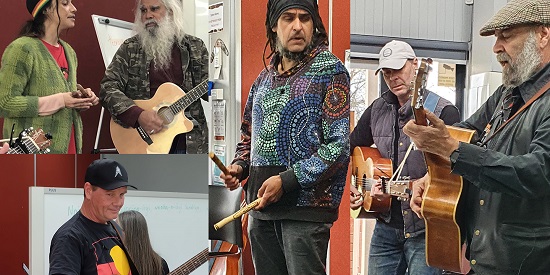Innovative new album of Gunditjmara songs released
Media release
Together with First Nations artists, researchers from the University of Melbourne and Deakin University have produced a new and innovative album of songs in Gunditjmara language, empowering communities to reclaim and celebrate culture.
The project, called 'Gunditjmara Alive' brings together Indigenous musicians, composers and vocalists to write, translate and reclaim Gunditjmara language through song.
The performance and professional recording of the songs drew on the skills of staff, graduates and students from the University of Melbourne’s Victorian College of the Arts (VCA).
The acts featured in the collection include Keerray Woorroong woman, Dr Vicki Couzens; Lee "Sonnyboy" Morgan, from the Gunditjmara Kirrae Whurrong clan; Kokatha/Gunditjmara Songman, David Arden; Gunditj Mirring Elder, Eileen 'Maude' Alberts; Indigenous Musician Singer/songwriter, composer and producer, Boorook and proud Gunditjmara Man, Professor Richard J. Frankland.
Frankland, who is Professor of Interdisciplinary Arts at Deakin University and Honorary at the University of Melbourne, said the album was an important form of creative cultural expression, as well as a means of keeping language alive and making it relevant and useful.
"We wanted to get language into people’s loungerooms, their homes and daily lives. Language is a key part of cultural strengthening," Professor Frankland said.
"When we have language, we have a bigger command of our identity and our roles in community."
Language revitalisation is not a simple process, requiring consideration and decision-making at every step. Records of the Gunditjmara dialects contain varying amounts of vocabulary and grammar but the language is incomplete.
Dr Vicki Couzens, a community linguist who undertook the complex process of translating the songs, said there were times during the translation process where a word had been lost or a suitable alternative simply didn’t exist.
"In those instances, the team had to go back to the basis of the language, borrow a neighbouring dialect or look to an anthropological stem to reconstruct a word," Dr Couzens said.
"Language is a reflection of our world view, cultural knowledge and ways of thinking. The grammar, too, reflects culture. This meant every word required thought, consideration of its context and true meaning."
The songs on the album are unique and varied. The music for Vicki Couzens' highly charged Future Pirates is performed by Californian band Cuattro, a group of Mexican Indigenous musicians and performers. Music video clips for five of the songs were filmed by VCA alumni, Daniel King.
The artists own the licence to their song and the accompanying film clip, providing them with control over the release and distribution.
Curator, historian and Postdoctoral Fellow at The University of Melbourne, Dr Sophie Couchman said 'Gunditjmara Alive' is an amazing resource and a unique contribution to the important work of language revitalisation.
"We want as many people as possible to enjoy listening to the songs, learn a few Gunditjmara words and help us keep this language and culture alive," Dr Couchman said.
The team has offered a series of workshops and performances for the community in Gunditjmara Country and is now hoping to work with school groups and others who would like to engage with the artists and their songs.
The Gunditjmara Bundiya album is available on the project website and also on IndigiTUBE and Bandcamp.
The project was made possible by the Indigenous Languages and Arts Project run by the Department of Communications and the Arts with the support of the Victorian College of the Arts, University of Melbourne and Victorian Corporation for Aboriginal Languages.

